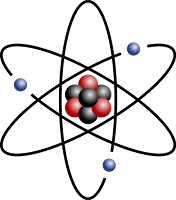John Dalton was the first scientist
who postulated in his Dalton’s Atomic Theory that each element had a
characteristic atomic mass. Atoms are extremely tiny particles which are even difficult
to see through microscopes. It became difficult for scientists to measure their
individual masses.
We have already seen about the
formation of ions in the previous post in this blog. Similar to how ion is
formed where atoms gain and loose electrons; even though the atoms are of less
electrons it is still the same element.
In the same way, if an atom is
losing a neutron or gaining a neutron that type of atom is called as ISOTOPE.
They are still the same element.
Finally scientists thought of
finding the atomic mass by comparing with standard atomic mass of some other
element. Before 1961, the physicists and chemists considered two sets of atomic
mass of Oxygen (atomic mass 16).
Chemists used naturally occurring oxygen
which is the mixture of isotope of Oxygen-16, Oxygen-17 and Oxygen-18. Physicists
used the isotope of Oxygen-16, because it given their measurement according to
their mass spectrometry.
So it confused the scientists which
isotope of oxygen should be taken for the mass comparison. In 1961, their
confusion came to an end by instead taking the isotopes of oxygen or hydrogen,
the isotope of Carbon was chosen as it contains 6 protons and 6 neutrons giving
a mass of exactly 12. Carbon- 12 atomic mass is measured accurately compared
with other elements in the periodic table.
So, now it is used as a standard
reference to measure the atomic mass of other elements. Carbon-12 is divided
into 12 equal parts where each part represents 1/12 of atomic mass of
crabon-12.
Atomic Mass:
The number of times one atom of given
element is heavier than 1/12th part of atomic mass of Carbon-12 is
known as Atomic mass. Atomic mass of an element is defined as the average mass
of all the isotopes of the element as compared to 1/12th of the mass
of one carbon-12 atom.
Atomic mass is measured in “amu” (atomic
mass unit). But through latest recommendations of IUPAC, the amu has been replaced
with “u” which is known as unified mass.
Atomic mass
of some elements



No comments:
Post a Comment